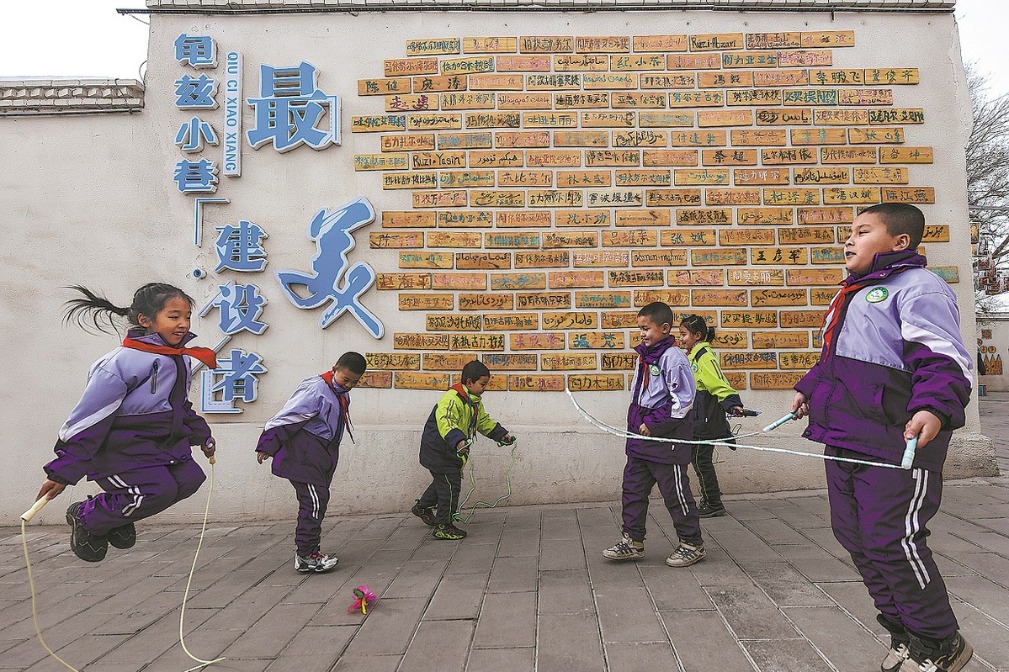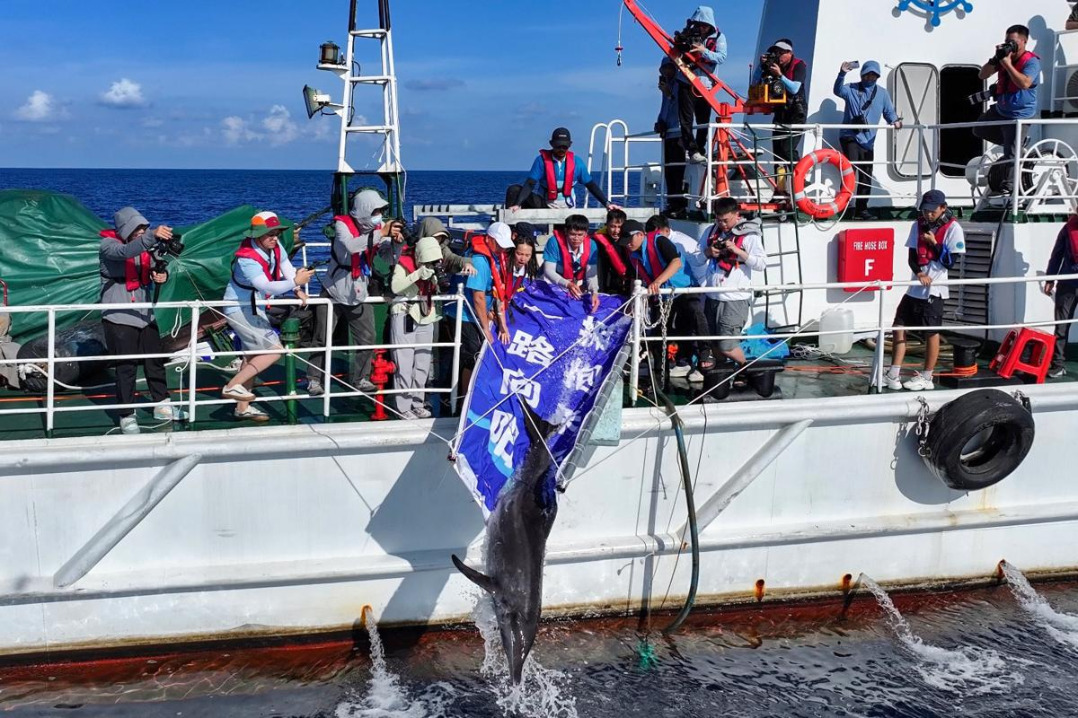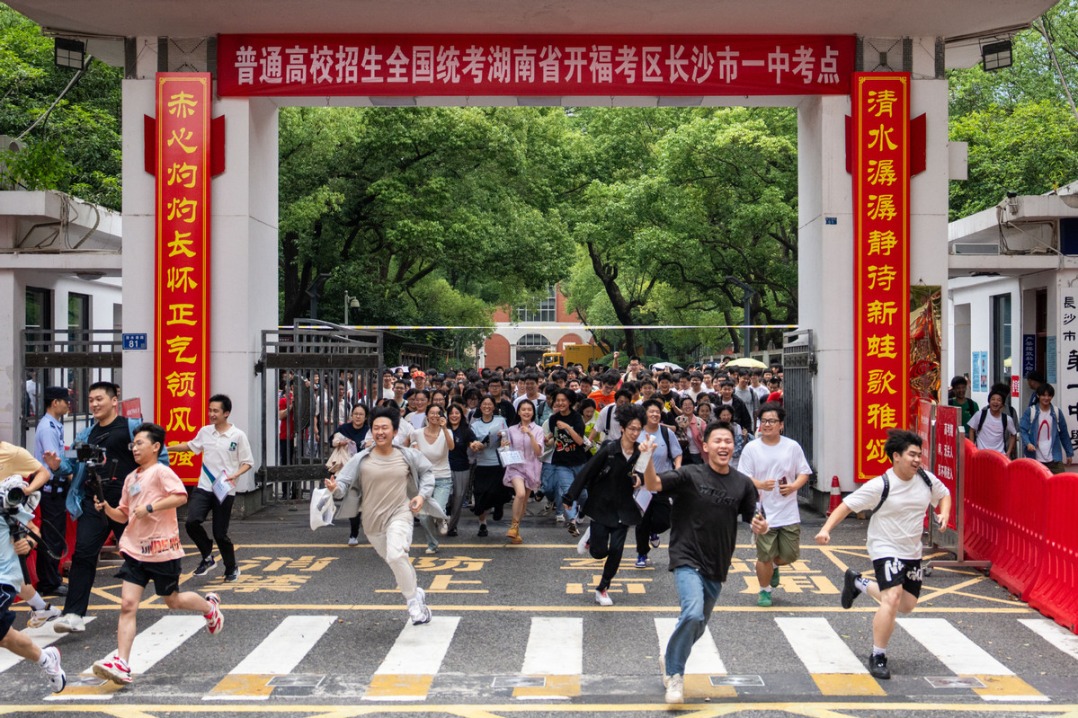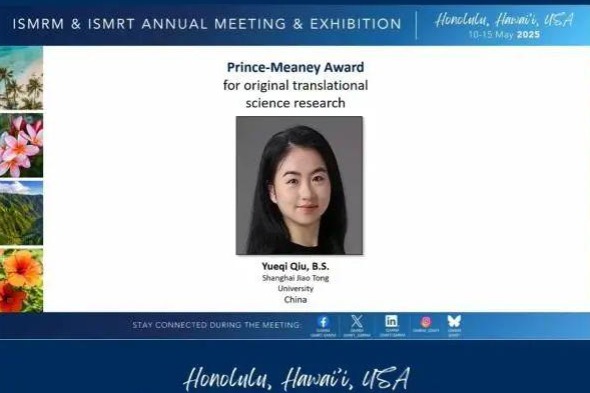DPP separatist efforts stoking tensions
Experts blame cross-Strait woes on US' collusion with Taiwan forces

Editor's note: The Taiwan question is a key focus for China and the international community. China Daily is publishing a series of reports to track hot Taiwan-related topics and address disinformation from the Democratic Progressive Party administration.
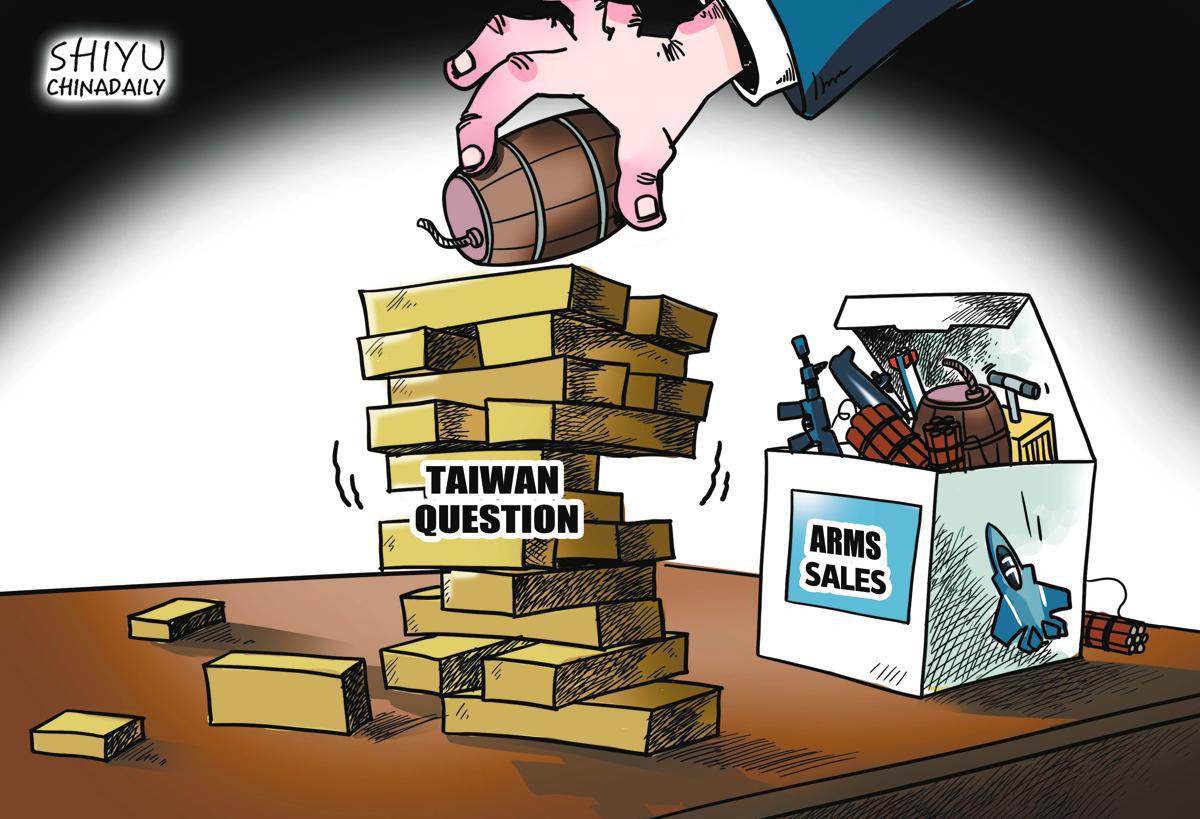
The biggest threat to peace and stability in the Taiwan Strait currently comes from the provocations for "independence" by the Democratic Progressive Party authorities in Taiwan and interference by external forces, multiple officials and experts have pointed out.
They noted that attempts to seek "independence" through military means and using Taiwan to contain China are "doomed to fail".
Jiang Bin, a spokesman for China's Ministry of National Defense, on Monday highlighted "yet another instance" of tension in the Taiwan Strait orchestrated by the United States and "Taiwan independence" forces.
According to recent media reports, the US is transporting a new batch of M1A2 tanks to Taiwan and plans to increase its arms sales to the island over the next four years. Jiang said that such moves infringe upon China's core interests and are an attempt to alter the status quo in the Taiwan Strait.
"Who is making provocations despite strong opposition from the Chinese side? Who is undermining cross-Strait stability and repeatedly stirring up troubles?" Jiang said.
"I'm sure everyone will see this clearly," he said, noting that China is strongly dissatisfied and firmly opposed to the US' actions.
The Taiwan question is at the very core of China's core interests, and is the first red line that must not be crossed in China-US relations, the spokesman said.
On May 15, retired US Navy Rear Admiral Mark Montgomery said during congressional testimony that there are about 500 US military personnel stationed in Taiwan, according to the South China Morning Post. The number vastly exceeds the previously known 41 personnel that were confirmed in a US congressional report a year earlier.
Jiang urged the US to stop all military collusion with Taiwan, warning that otherwise it will get burned for playing with fire and do more harm than good.
He also warned the DPP authorities that US weapons cannot save them, and relying on external forces to achieve "Taiwan independence" is a failing strategy.
During the recently concluded Shangri-La Dialogue in Singapore in early June, Taiwan was once again a key topic used by Western countries, including the US, to hype the so-called China threat.
US Defense Secretary Pete Hegseth claimed in his speech that the Chinese mainland has ordered its military to be capable of "invading" Taiwan by 2027, while warning that any attempt by the mainland to conquer Taiwan by force would result in devastating consequences for the "Indo-Pacific" and the world.
In addition, he claimed that "Beijing is credibly preparing to potentially use military force to alter the balance of power in the Indo-Pacific".
In response, another China's Defense Ministry spokesman Zhang Xiaogang said on June 1 in a statement that the Taiwan question is purely China's internal affair, and the US has no right to make irresponsible remarks, let alone attempt to use it as a bargaining chip to contain China.
The People's Liberation Army will resolutely safeguard national sovereignty and territorial integrity and firmly crush any "Taiwan independence" separatist plots and any external interference, he said.
"Our determination and will are rock-solid, and our capabilities and means are strong and reliable," said Zhang.
Atia Ali Kazmi, director for Global and Regional Studies at the Institute for Strategic Studies, Research and Analysis in Pakistan, said that the biggest threat to peace in the Taiwan Strait stems from provocations that challenge China's territorial sovereignty under the guise of "strategic balancing".
Any attempt to militarize Taiwan or use it as a tool to contain China destabilizes the regional security architecture, said Kazmi, who is also a delegate to the Shangri-La Dialogue.
"The Taiwan question is China's internal affair. Stability in the Strait requires all external actors to avoid interference, uphold international law and respect China's core interests," she said.
"Lessons from other conflict-prone regions, including South Asia, underscore that violations of territorial integrity are the primary triggers of escalation. Peaceful resolution lies in dialogue, not deterrence," she added.
However, the US and Taiwan's DPP authorities continue to exploit the situation by hyping China's military activities in the Taiwan Strait, claiming that it is China's military actions that have heightened regional tensions.
In a recent interview with The Wall Street Journal, US Pacific Army Commander Ronald Clark claimed that China's "aggressive behavior" has made the environment in the "Indo-Pacific" more dangerous.
He said that China's rehearsals of a potential blockade of Taiwan have become commonplace, something he wouldn't have thought possible five years ago.
Zhang, the Ministry of Defense spokesman, criticized Clark's comments at a late May news conference, pointing out that the biggest challenge to the Taiwan Strait situation comes from "Taiwan independence" separatist provocations and external forces' interference and disruption.
"China's actions to safeguard national sovereignty and territorial integrity are entirely justified, necessary, reasonable and lawful," he stressed, urging the US to stop fueling tensions over the Taiwan question, or it will only end up harming itself.
Since then-US House speaker Nancy Pelosi visited Taiwan in 2022, the Chinese mainland has conducted at least four large-scale military exercises encircling Taiwan, actions that are believed to be meant to punish and deter US-Taiwan connections and "Taiwan independence" separatist forces.
Zhou Bo, a senior fellow at Tsinghua University's Center for International Security and Strategy, said such exercises have placed more and more pressure on Taiwan leader Lai Ching-te and the DPP authorities, adding that in the future, the PLA will conduct various exercises in the region when it wants, where it wants and in any form it chooses.
However, "it's very important to note that the Chinese mainland still adheres to peaceful reunification," Zhou said. "These exercises do not necessarily indicate that the mainland will use force for reunification; it does not mean that force will definitely be used."
The researcher pointed out that to eliminate the threats to peace and stability in the Taiwan Strait, Taiwan must acknowledge the 1992 Consensus, and the US must adhere to the one-China principle.
"The US cannot say one thing and do another, hollowing out the one-China principle," he said.
In an interview with Taiwan media in late May, Taiwan's "defense chief" Koo Li-hsiung repeatedly cited comments from US politicians to hype the "threat" from the Chinese mainland, claiming that countries should collectively deter China and not allow it to think that other nations won't intervene if it resorts to using force against Taiwan.
In response, Chen Binhua, a spokesman for the State Council's Taiwan Affairs Office, said at a late May news briefing that the DPP authorities, in pursuit of political gain, are coordinating with the US to turn Taiwan into a powder keg, provoking conflict and pushing the people of Taiwan into danger with malicious intent.
"No matter how the situation changes within Taiwan or how external forces interfere, the historical trend of China's eventual and inevitable reunification cannot be stopped," he said.
Q&A
Q: How has Taiwan's military strategy and budget allocation evolved?
A: The armed forces in Taiwan include an army, navy, air force and its information, communications and electronic force command. The army has over 96,000 personnel, the navy over 32,000, and the air force over 36,000. The Taiwan military has planned to expand its forces annually, aiming to reach 268,600 personnel by 2029, deployed across more than 40 islands, including on the main island, Penghu, Jinmen and Matsu. Taiwan extended its compulsory military service from four months to a year in 2024.
Taiwan primarily purchases its advanced weaponry from the United States. Military spending has consistently ranked at the top of Taiwan's total budget allocations. Since Chen Shui-bian took office in 2000, there has been a gradual escalation of "pro-independence" activities, leading to continuous growth in military budgets. In 2008, Taiwan's military budget accounted for 2.54 percent of the region's GDP. During Ma Ying-jeou's term from May 2008 to May 2016, benefiting from improved cross-Strait relations, Taiwan's military budget as a percentage of GDP decreased overall to 1.87 percent by 2016. Under Tsai Ing-wen's term from May 2016 to May 2024, Taiwan's military budget increased 81 percent compared to 2016.
Since Lai Ching-te took office in May 2024, he has intensified the portrayal of the "military threat" from the mainland, accelerated military preparedness and deepened military ties with the US. Additionally, efforts have been made to enhance control over the military, promote arms purchases from the US and construct a "comprehensive national defense system" to strengthen Taiwan's "asymmetrical warfare capabilities" and operational sustainability, with the aim of seeking "independence" through military means and resisting reunification through force.
SOURCE: THE BOOK ON THE TAIWAN QUESTION FOR THE CADRES COMPOSED BY THE STATE COUNCIL TAIWAN AFFAIRS OFFICE
jiangchenglong@chinadaily.com.cn
- More Chinese provinces extend marriage leave in family support push
- World's first wind-powered commercial underwater data center project launched in Shanghai
- Chinese, Israeli scientists develop new approach to make large-scale genetic editing
- China's AG600 aircraft greenlighted for mass production
- Hong Kong to release 2025 policy address ahead of schedule in Sept: HKSAR chief executive
- China set to build future workforce with new tech-centric college majors

















